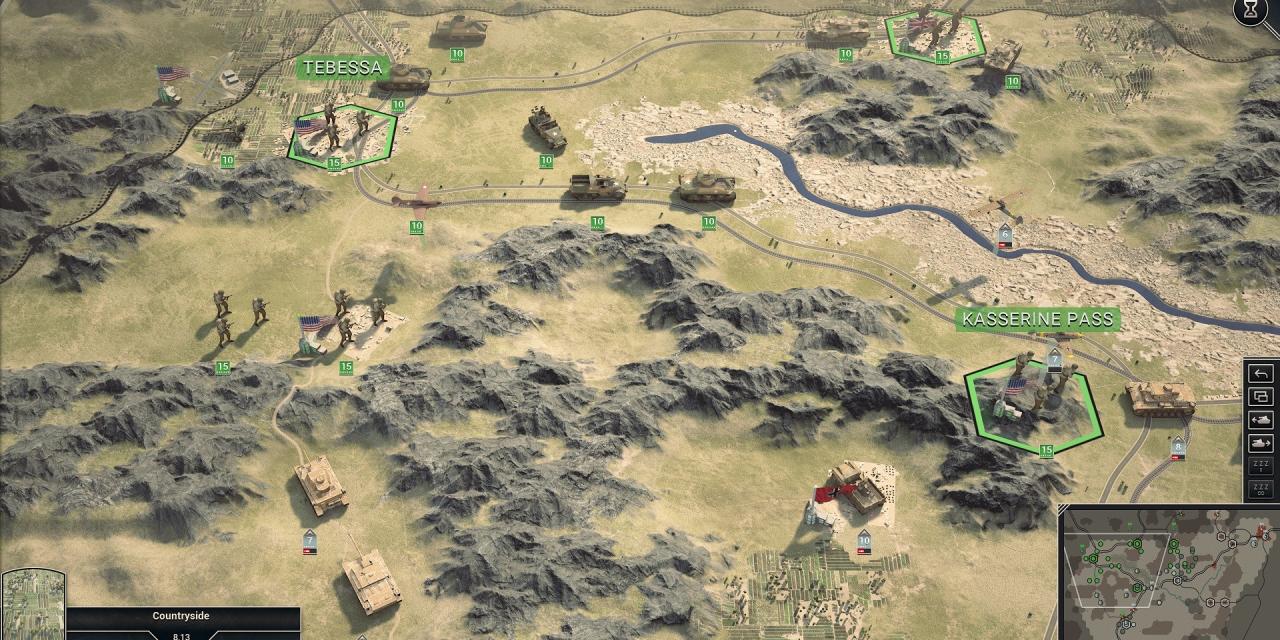
- PC
Retreat and Surrender:
Land-based units that suffer devastating non-ranged attacks that kill 66% of
their unsuppressed strength will attempt to retreat immediately following the
attack unless they are currently entrenched to a level greater than their base
entrenchment on that hex. Units will attempt to retreat in a direction away
from the attacker and may retreat multiple hexes to reach safety. However,
retreat comes with a cost: any movement points that the unit uses retreating
will not be available for the unit to use in its own next turn. Units cannot
enter their transports when retreating (although the transport will not be
lost). If a unit cannot retreat, whether due to running out of next turn’s
movement points or having nowhere to go, it will surrender instead.
When a unit surrenders, the attacker is rewarded with prestige equal to the
value of the surviving part of the surrendering unit.
Note: In addition to being unable to retreat into tiles occupied by other
units or impassable terrain, units will try to avoid retreating into an
enemy’s zone of control.
Some types of units, in particular tanks, artillery and anti-tank and anti-air
guns can be ‘captured’ when they surrender. Captured equipment is saved, and
if enough of it is accumulated it is possible to build new units using the
enemy’s weapons in the Purchase Screen. To do this, you need to capture enough
strength points of equipment to form a new 10-strength unit (for instance, if
you wanted a German KV-2 unit, you would need to force the surrender of ten
strength points’ worth of KV-2s from the Red Army, which would likely require
the surrender of several KV-2 units). Such units require the surrender of more
of that type of equipment in order to receive replacements.
A further special case of retreats exists when a ship in a port is attacked
by an infantry or tank unit. If able to, the ship will flee the port, and if
it has nowhere to go it will be scuttled (destroyed) instead.
Rivers and Bridging Units:
Rivers are a common terrain obstacle that pose significant challenges for a player on the offensive. There are two types of rivers in the game: minor and major rivers.
Minor rivers can be crossed by units, but the process takes several turns and can seriously hamper an offensive. To cross a minor river, a unit must begin its turn on a hex directly adjacent to the river, and entering the river hex will use up the unit’s entire move. The next turn, the unit will be able to move freely onto either bank of the river.
Major rivers, represented by much wider rivers on the map, are completely impassable to most ground units unless they have frozen over. There are two exceptions to these rules: bridges and bridging units. Road bridges exist wherever a road or railroad crosses over a river tile. Units can travel across the bridges just like any other road (or in the case of a railroad, as if the river were merely not there), making them the easiest way to cross a river. Beware however that the other bank of a river will often be most heavily defended near bridges.
Bridge engineers and vehicles are special units that allow other units to cross the river as if a bridge existed over it. To use them, a bridging unit, such as the German Brückenpioniere, must occupy a river hex. Other units then move "through" that unit to access the other bank of the river. When the bridge unit is moved off the river, the hex it once occupied will no longer count as a bridge. If you have a spare core slot, it may be a good idea to split your bridge units to form two units, and thus two bridges.
Note: It may be a good idea to keep a bridging unit or two in your reserves, to be activated if a scenario with large rivers is encountered. Although they will be provided as auxiliaries if required to win a scenario, many maps can be more easily completed by using bridge engineers.
Units that occupy river hexes, except for bridging units, suffer major combat
penalties, especially against units on either bank. It is often wise to find another direction from which to launch an attack rather than charging straight across the river.






